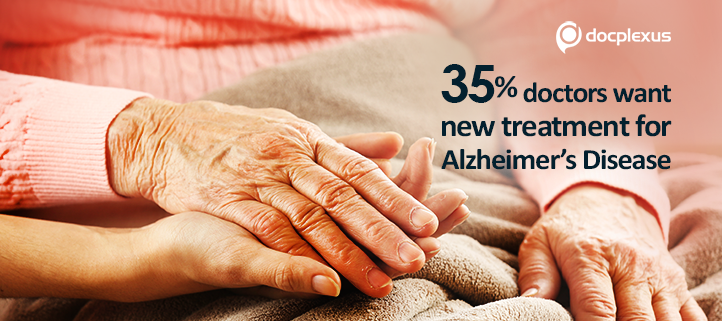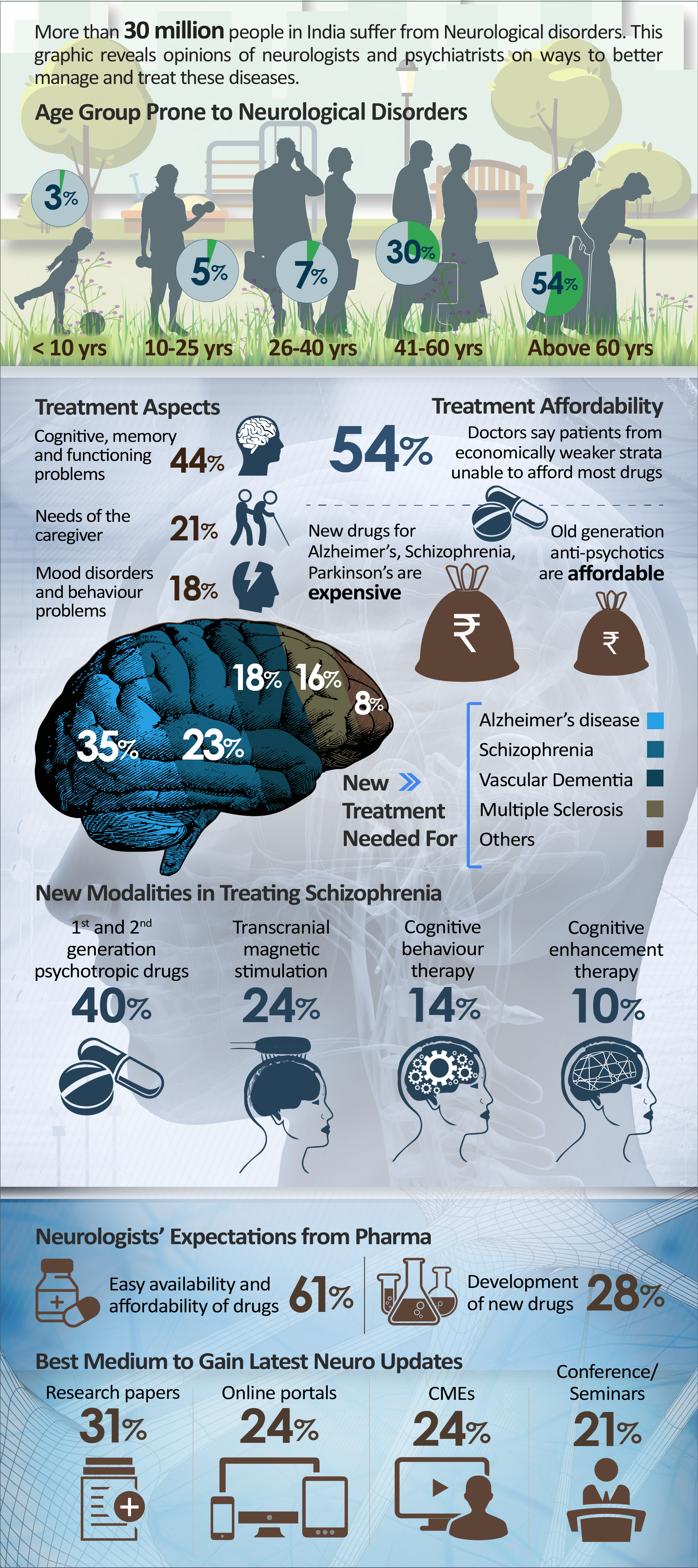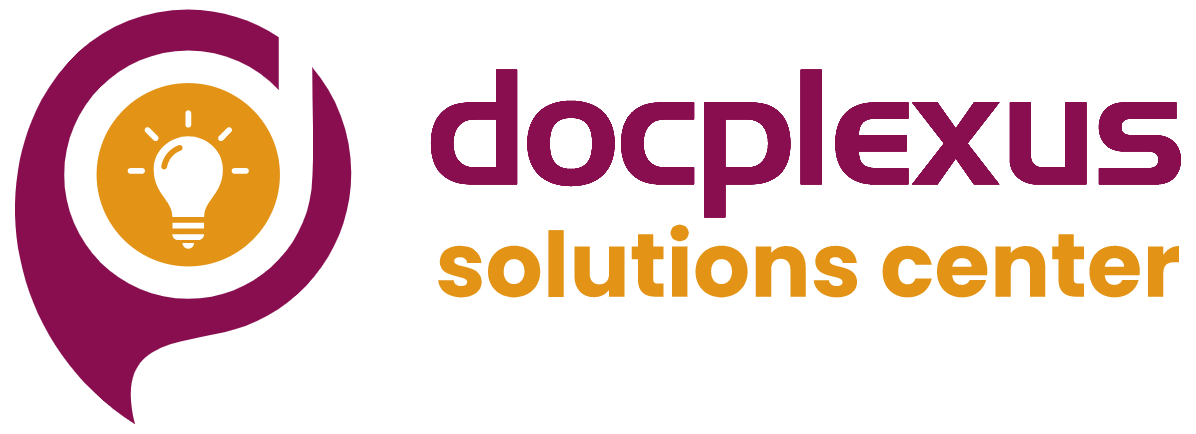
More than 1 billion people across the world are affected by Neurological Disorders (NDs), 50 million suffer from epilepsy, and 24 million from Alzheimer’s and other dementias. In India, more than 30 million people suffer from these ailments. Despite a substantial decrease in mortality rate due to stroke and communicable NDs, incidence continues to increase. This means the number of patients needing clinical care from neurological experts is bound to rise in the coming years. The current treatment options are highly priced, unavailable in rural areas, and do not offer complete cure in some diseases. Another concern among doctors is the current drugs’ inability to treat patients with comorbidities.
In 2016, according to Credence Report, the treatment market for NDs was valued at USD 75.3 billion, expected to nearly double by 2025 with Asia-Pacific growing at the fastest rate.
Pharma should seize this opportunity – understand HCPs’ needs and fulfill them by developing the right treatment solutions. Docplexus conducted a study to gain doctors’ opinions on the management of NDs. Here are the insights.
Survey Details
Aim: To understand doctors’ opinions on the management of neurological disorders
Survey Methodology: Nation-wide online poll on Docplexus platform
Sample Size: The survey was completed by 376 doctors comprising neurologists, pediatric neurologists, and psychiatrists
Survey findings:

Analysis:
Most Patients Are Senior Citizens
54% of patients are above the age of 60. Increased life expectancy is a major cause of these high numbers. “People live longer and, accordingly, suffer from dementia more often than several decades ago,” recorded a Russian researcher Vasily Vlassov in October 2017. Old age increases the chances of memory loss, thus giving way to diseases like dementia.
This is not to say it is a problem exclusive to the old. Some NDs are specific to the younger populace. For instance, the incidence of Epilepsy is high among children below the age of 5. Those related to headaches are commonly found in people between the age of 25 and 49. 37% of all neurology patients belong to the 26-60 years age category.
Doctors Decide Treatment Based on the Cognitive Abilities of Patients
Treatment for NDs is decided based on preliminary examination of patients and results of some tests carried out to confirm a few symptoms. Doctors rely on the assessment of motor and sensory skills, speech, vision, hearing, functioning of cranial nerves, mental status, coordination, balance, mood, and behavior besides other abilities. For 44% of physicians, cognitive ability is the deciding factor. 18% of doctors base their treatment on changes in mood and behavior.
Parkinson’s, Alzheimer’s, Schizophrenia, Delirium, etc. require significant attention by caregivers, and 21% of doctors stated that they looked into this need while prescribing treatment for their patients.
Easy Availability and Affordability of Drugs Can Improve Patient Outcomes
30% of doctors opine that high prices deter effective treatment of NDs in India. 56% stated that though some anti-epileptics and antipsychotics are affordable, many new drugs for Alzheimer’s, Schizophrenia and Parkinson’s are expensive. A recent study published by Girish N Rao and Srikala Bharath from the National Institute of Mental Health and Neurosciences (NIMHANS), Bengaluru, found that the average cost of care for dementia in an urban household is between INR 45,600 and INR 2,02,450, while that in rural households is between INR 20,300 and INR 66,025.
61% of doctors wish Pharma would work towards improving availability and affordability, especially for people from lower economic strata. Patients face hardships in procuring medicines, especially for diseases like Alzheimer’s or Parkinson’s that need long-term treatment. Another study by NIMHANS showed that the supply of neurological drugs is often interrupted and that most drugs mentioned in the list of essential drugs were available at the district level but not in rural areas.
New Drugs are the Need of the Hour
35% of doctors want new treatment for Alzheimer’s and 23% for Schizophrenia.
About 1.6 million Indians suffer from Alzheimer’s today, and this is expected to triple by 2050. As far as Schizophrenia is concerned, Docplexus Study shows that 44% of doctors in India are dependent on first and second-generation antipsychotics and 24% rely on transcranial magnetic stimulation. Doctors decide the treatment based on the severity of the illness and risk factors. Current drugs are inadequate to treat patients with higher severity and comorbidities like cardiovascular diseases and diabetes.
New treatment options are also needed for persistent postural-perception dizziness (PPPD), cerebral palsy, autism, frontal lobe dementia (FTD), and cerebrovascular disorders.
Online is the Latest Medium of Information Consumption for Doctors
A Docplexus study shows that more than 80% of doctors look for information online. Digitization is rapidly transforming the Online Behaviour of Doctors. 24% of doctors who took this survey stated they prefer to look for treatment and other medical aspects of NDs on digital portals. An equal number of doctors acquire information from continuing medical education (CME) programs, while 31% rely on research papers. However, the consumption of information on online platforms is bound to rise in the future, and Pharma should share research papers and conduct Online CMEs on digital platforms. Third-party portals that are perceived as neutral offer a range of next-gen content marketing solutions that physicians trust.
Key Takeaways for Pharma
India holds huge potential for Pharma – to tap into the wide patient base. Companies should know about the market while planning their marketing strategies.
- India will hold a significant share in the USD 130 billion global market for NDs by 2025
- Reducing costs and improving the availability of existing drugs will be critical for companies eyeing the Indian market
- Doctors need new treatment for Alzheimer’s, Schizophrenia, and Parkinson’s diseases
- While the responsibility lies on large pharma companies with expertise in drug development for NDs, small biotechnology companies with a focus on a specific disease will also have a role to play
- Some companies have acquired patents for path-breaking drugs to treat NDs
- When 80% of doctors are accessing information online, Pharma should consider providing information about these drugs on relevant platforms
If you’re interested in gaining similar insights into the target audience for your therapy area, contact solutions@docplexus.net
Docplexus is one of the world’s largest & fastest-growing networks of verified doctors & a trusted marketing partner of pharma, medical devices, diagnostics & nutraceutical companies. We empower our industry partners to meaningfully engage with the medical community through data-driven, evidence-based marketing & brand management solutions such as infocenter (branded microsite), mindset analysis, KOL webinars, sponsored medical updates, online CMEs & more.
